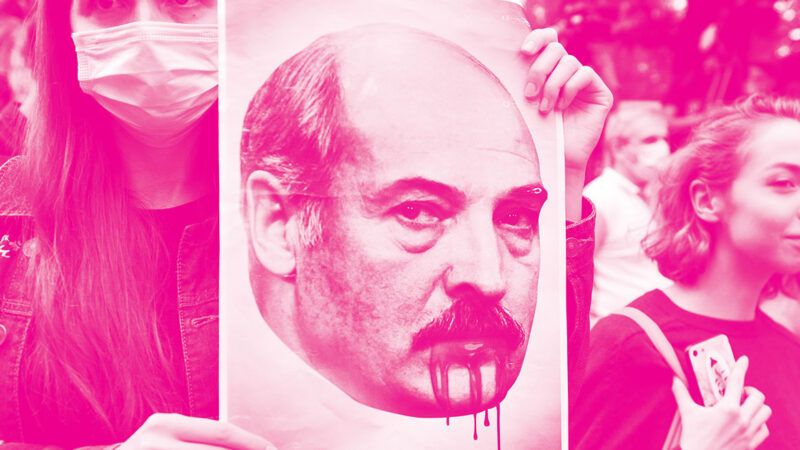A Soviet-Style Strongman Still Rules Belarus
In many ways, Belarus is stuck in the USSR.

Reason's December special issue marks the 30th anniversary of the collapse of the Soviet Union. This story is part of our exploration of the global legacy of that evil empire, and our effort to be certain that the dire consequences of communism are not forgotten.
On August 25, 1991, Belarus formally gained its independence from the Soviet Union. But in many ways, the country is stuck in the USSR.
Streets are still named after famous Communist figures, and a statue of Lenin sits in the capital city of Minsk. The state intelligence agency is still called the KGB. And callbacks to Soviet times go much deeper.
Democratic governance, freedom, and flourishing in Belarus have long been hampered by Alexander Lukashenko, a demagogue and dictator who took power in 1994. In the country's first and only open election, Lukashenko—who ran on an anti-corruption platform—was elected president. But once in office, he proved reluctant to let go of power or tolerate dissent.
"Openly nostalgic for Soviet times," as the Associated Press put it in 1996, Lukashenko was dismissive of the country's parliament, hostile to constitutional limits, and enthusiastic about state control of information. From the beginning, he was warm to Russia, signing a friendship treaty in 1995 that included concessions such as allowing Russian troops to be stationed in Belarus. He continues to encourage the people to speak Russian, not Belarusian.
By 1996, Lukashenko was proposing constitutional amendments to extend his term in office and expand his power. Parliament would not approve a referendum on it, instead proposing impeachment. "I will not give up the reins of power," Lukashenko vowed in response. And he hasn't.
Lukashenko has held on to his position by quashing opposition, suppressing nonstate media, interfering with elections, and otherwise denying civil liberties and political freedom to Belarusians.
"We have a revival of the ideological control and brainwashing that prevailed in the past," journalist Zhanna Litvina told the Committee to Protect Journalists back in 1997, after the independent radio station she had worked for was shut down by the authorities. "Only this time it is not by the Communist Party but the propaganda of one man and his followers."
Belarus held its second presidential election in 2001, with Lukashenko declaring a suspiciously large victory for himself. The margin supposedly grew even bigger in 2006, and the Organization for Security and Co-operation in Europe (OSCE) declared that it "failed to meet OSCE commitments for democratic elections."
Little has changed since then, despite periodic pushback from Belarus' democratic activists. "My country is in serious trouble. It is governed by one man. And it is ruled by violence and unpredictability," Alyaksandr Kazulin, former leader of the Belarusian Social Democratic Party, told the Oslo Freedom Forum in 2010.
Lukashenko went on to declare presidential victories in 2010, 2015, and 2020.
The last "win" went down rough with Belarusians. "Leaked results and unofficial polling showed" that main opposition candidate Sviatlana Tsikhanouskaya "had in fact won the election," according to the Human Rights Foundation.
This time, Lukashenko's claims that he had received 80 percent of the vote spurred what were likely the biggest anti-government protests in post-Soviet Belarus. For days in August 2020, people took to the streets in Minsk and elsewhere.
But the big show of dissent was met with a big show of force. Cops punished protesters with tear gas, violence, and arrests; thousands were reportedly detained. Amnesty International said the election was "a catalyst for the most egregious crackdown on freedoms of expression, peaceful assembly and association in Belarus' post-independence history."
As of August 2021, an estimated 649 detained Belarusians were considered political prisoners. Most of them "were targeted by politically motivated criminal prosecution in connection with the events that took place during and after the presidential election of August 2020," according to the Viasna Human Rights Center.
During this summer's Olympic games, Belarusian authorities allegedly tried to force Kristina Timanovskaya—in Tokyo to compete in the women's 200 meter sprint—back to Belarus after she criticized the country's sporting authorities on Instagram for entering her into relays without her consent. Timanovskaya fled to Poland instead.
This summer, Belarusian authorities also diverted a commercial flight in order to arrest an opposition journalist, prompting sanctions from the U.S. and the European Union. But many experts worry that isolation from the international community will push the country further into authoritarianism.
The Atlantic Council warned this year of a soft takeover of Belarus by Russia. It "will not be a spectacular event like the 2014 annexation of Crimea," nor "a shock-and-awe spectacle like the 2008 invasion of Georgia," suggested the Council. "Instead, we should be prepared for a slow, stealthy, and methodical operation that will be over before most people even know it is happening. It will be an annexation hiding in plain sight. Think of the old metaphor of a frog in boiling water."


Show Comments (49)